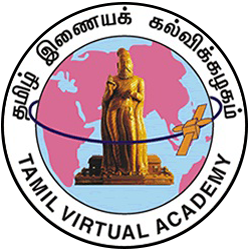P10343 Vikrama Chozhan Ulaa
This lesson discusses the
various aspects of ‘Vikrama Chozhan Ulaa’ composed by the renowned
poet Ottakkoothar. Ottakkoothar who served as the court poet during
the reign of the three chozha kings- Vikrama Chozhan, Kulothunga
Chozhan and Rajaraja Chozhan- wrote the ‘Moovarulaa’ in celebration
of these three kings. ‘Vikrama Chozhan Ulaa’ is the first part of
this work.
‘Ulaa’ is one of the 96 minor literary genres
collectively known as ‘sittrilakkiyangal’ in Tamil. An Ulaa is a
detailed description of a hero ie (paatudaithalaivan) setting out
in a grand procession along the streets with his troupe. Enamoured
by the nobility, grandeur and valour of the thalaivan, various women
of the town fall in love with the thalaivan. These women are usually
the ‘parathaiyar’ or the courtesans. The main aim of an Ulaa is
to extol the noble virtues of its protagonist.
Ulaa was initially a part of the epics.
It later evolved into a minor literary form. Ulaa Ilakkiyam has
a strong religious background. Some of earliest examples of this
literary form depict the procession of Gods. These are called the
‘Deiveega Ulaa’. ‘Thirukkailaya Gnana Ulaa’ which extols the greatness
of Lord Shiva and the beauty of Goddess Parvathi is a classic example
of this type of Ulaa. Later this form came to be extensively used
by court poets to celebrate the virtues of the kings, patrons and
great heroes.
Ulaa is written in ‘kannis’, which are stanzas
of two lines with the same number of metrical feet. An Ulaa is structurally
divided into two parts. The first half called ‘Dasaangam’ offers
an extensive description of the protagonist. It also speaks of his
notable qualities such as his ancestry, good looks, wisdom, manliness,
benevolence, genteel nature, valour etc. It also describes the thalaivan
getting ready for the procession and the warm reception he is given
by the people. The second half of an Ulaa depicts 7 types of women
- pethai, pethumbai, mangai, madanthai, arivai, therivai and perilampen
- who happen to see him and fall in love with him.
‘Vikrama Chozhan Ulaa’ is made of 342 ‘kannis’
or stanzas. The first 23 stanzas trace the ancestry of the chozha
kings and celebrate the glory of some of the distinguished chozha
kings. Stanzas 24 to 27 sing the praise of Kulothungan I. Stanzas
28 t0 35 depict the birth of King Vikrama Chozhan and extol his
virtues. Stanzas 36 to 52 present an elaborate description of the
King getting ready for the royal procession. The grandeur of the
royal elephant is brilliantly portrayed in stanzas 53 to 64. Stanzas
65 to 90 offer an arresting picture of the royal procession through
the streets. The remaining stanzas sketch the plight of the women
who pine for the love of the King. The stanzas are set in a metre
called ‘kalivenba’.
‘Vikrama Chozhan Ulaa’ is an important historical
document as it has numerous references to social and political events
of the period. It highlights the remarkable achievements of King
Vikrama Chozhan.
The lesson contains a brief study of some
of the important sections of this text such as the description of
the procession, the plight of the love-struck women and the greatness
of King Vikrama Chozhan.
‘Vikrama Chozhan Ulaa’ is noted for its
poetic beauty. It testifies to the power of imagination of Ottakkoothar’s
poetry and is full of arresting metaphors and striking figures of
speech.


